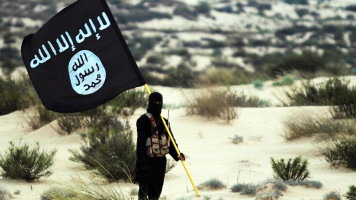Amnesty urges release of Tunisian LGBTQ activist jailed for 'insulting' police
Amnesty urges release of Tunisian LGBTQ activist jailed for 'insulting' police
The human rights organisation has called on Tunisian authorities to drop the charges against Rani Amdouni ahead of her appeal hearing on Wednesday.
2 min read
Amdouni was arrested late last month [Getty]
Amnesty International joined calls for the release of a prominent Tunisian LGBTQ+ activist on Tuesday, urging authorities to drop the "spurious" charges against her.
"Rania Amdouni's arrest and prosecution sends a chilling message to activists who face harassment that if they dare to come forward to report police abuse they risk being turned from victim to accused," said Amna Guellali, Amnesty's Deputy Director for the Middle East and North Africa.
Amdouni was arrested late last month after going to a police station to report past harassment she had faced from law enforcement officers due to her LGBTQ activism.
The 26-year-old activist, known for her exuberant presence during pro-democracy protests, was the target of a smear campaign fueled by police unions after participating in protests against repression in January.
Police officers at the station turned her away. A distraught Amdouni began shouting and swearing at them, and was arrested.
She has since been sentenced to six months in prison for "insulting a public officer". Amdouni was also charged with "visible drunkenness" and "causing embarrassment and disruption".
"It is outrageous that Rania Amdouni has been sentenced to six months in prison simply for making comments deemed offensive about the police. She must be immediately and unconditionally released and all the charges against her should be dropped," Guellali said in a statement on Tuesday.
"Insult" is not considered to be a crime under international law, and countries using the term "unduly limit free expression", Amnesty said.
"Tunisia's authorities are using Article 125 as a catch-all charge to prosecute all those who dare to criticise the police or complain about their conduct," explained Guellali. "They must stop prosecuting activists and human rights defenders on vague charges and urgently protect the right to freedom of expression."
Amdouni's appeal will be heard on Wednesday.
Agencies contributed to this report
Follow us on Facebook, Twitter and Instagram to stay connected
"Rania Amdouni's arrest and prosecution sends a chilling message to activists who face harassment that if they dare to come forward to report police abuse they risk being turned from victim to accused," said Amna Guellali, Amnesty's Deputy Director for the Middle East and North Africa.
Amdouni was arrested late last month after going to a police station to report past harassment she had faced from law enforcement officers due to her LGBTQ activism.
The 26-year-old activist, known for her exuberant presence during pro-democracy protests, was the target of a smear campaign fueled by police unions after participating in protests against repression in January.
Police officers at the station turned her away. A distraught Amdouni began shouting and swearing at them, and was arrested.
She has since been sentenced to six months in prison for "insulting a public officer". Amdouni was also charged with "visible drunkenness" and "causing embarrassment and disruption".
"It is outrageous that Rania Amdouni has been sentenced to six months in prison simply for making comments deemed offensive about the police. She must be immediately and unconditionally released and all the charges against her should be dropped," Guellali said in a statement on Tuesday.
"Insult" is not considered to be a crime under international law, and countries using the term "unduly limit free expression", Amnesty said.
"Tunisia's authorities are using Article 125 as a catch-all charge to prosecute all those who dare to criticise the police or complain about their conduct," explained Guellali. "They must stop prosecuting activists and human rights defenders on vague charges and urgently protect the right to freedom of expression."
Amdouni's appeal will be heard on Wednesday.
Agencies contributed to this report
Follow us on Facebook, Twitter and Instagram to stay connected







 Follow the Middle East's top stories in English at The New Arab on Google News
Follow the Middle East's top stories in English at The New Arab on Google News

![Beirut stadium [Getty]](/sites/default/files/styles/image_330x185/public/1235817272.jpeg?h=a5f2f23a&itok=0UZr2fIL)
![Israeli forces destroyed a religious shrine in the village of Shama in southern Lebanon [Getty]](/sites/default/files/styles/image_330x185/public/2184560625.jpeg?h=a5f2f23a&itok=Ge_H4GfP)